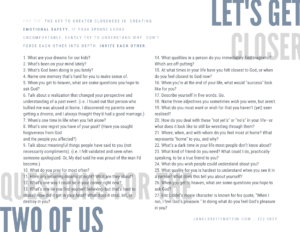
This is one of those posts where I’m not an expert, just a mom. (Um, most of my posts?!)
But maybe these small ideas will help. And if I’m smart, I’ll keep this short, right?

This is one of those posts where I’m not an expert, just a mom. (Um, most of my posts?!)
But maybe these small ideas will help. And if I’m smart, I’ll keep this short, right?

If you’ve followed this blog for awhile, you know I taught refugees for a handful of years, many of them Muslim–people and a task I adored.
I was surprised to learn a difference between the Bible and the Qur’an: The Qur’an isn’t a narrative, like much of the Bible is. (The Qur’an is laid out more like Psalms or Proverbs.)

Okay, yes, I am this big Enneagram 2, and I am frequently caught “two-ing” in my family—overfunctioning like a crazy person, sublimating any needs of my own, etc.
But I also have this monstrous, flapping-larger-than-my-triceps 3-wing. Which means, for all of you unfamiliar with enneagram-speak, that I am an achiever. Goal-setting can fill my sails (…to the point of what we’ll call “Christian workaholism”).

If you’ve been a longtime follower of this blog, bear with me today as I repost an oldie but a goodie, due to extenuating circumstances. It remains true: To the yes-man or -woman in my life, I need you.
Thanks, everyone, for the grace. – Janel

As part of the premise of this blog, I commit to uncomfortable conversations worth having. And the onus of that falls on me—toward authenticity in the midst of my own doubt and weirdness.
So today, I’m opening the convo with something I regret.

Before my husband’s last (pre-COVID) international trip, I realized one of the things I miss most about him.
As he was packing–so methodical, everything in precisely-sized containers, shirts carefully folded over a packing template–I told him quietly, “See, you humanize me.”
Reading Time: 5 minutes

Anyone else out there go through these seasons when you’re struggling to find hope around one of your kids?
Gnawing on this recently, I realized I’ve gone through seasons of this with each of my kids. Some more than others, sure. But there was that year when I was deeply concerned about my daughter’s manipulation. Or my son’s ADHD taking a wrecking ball to his relationships. Or that kid whose ego I could see splintering him off from listening to God.
I confess I’ve had some of those days lately, emphasized by the occasional argument or just the regular triggers of my own fear. For one particular conflict, I felt like God gave me so much grace in the moment to handle it…but I woke up in the morning wrecked.
I asked my husband, How is that doing the right thing feels so horrible?
(I know. Welcome to parenting.)
So I’m scribbling down reminders to myself today, and thought you might want to peek over my shoulder. ‘Cause maybe you’re there, too.
Recently on a walk, I asked God if he would give me just one slice of hope around this child every day. (Honestly, a tiny voice in me wondered if I was setting myself up for disappointment.)
But I’ve been delightfully surprised. God has indeed given me at least one thing to hope for every day.
And there’s even some psychology behind that. Social researcher Shaunti Feldhahn points out that looking for things to praise a person for changes our own brains. Our own hearts.
You might say it’s thinking on what’s true, noble, right, pure, lovely, excellent, praiseworthy (Philippians 4:8-9). (Keeping a running list helps, too.)
Feldhahn tells the story of a woman who accepted Feldhahn’s researched-based 30-Day Kindness Challenge, but told Shaunti, “You don’t know my husband.”
The Challenge, see, requires praising or appreciating one thing each day about the person who’s the object of your challenge. The woman thought she’d need to store up a bank of things to praise him for, because she wouldn’t have something each day.
But as she continued with the challenge, her list of things to praise…grew. Every. Day.
Finding sources of praise–toward God about my child, or verbally to my child–changes me.

This is my next step, I decided after that conflict. I’m taking the Challenge for this child (just one person the first time, Shaunti suggests). Scroll down on this page on Shaunti’s website for the three requirements to complete each day for 30 days.
I’ve increasingly realized my interpretations of events–the stories I tell myself–powerfully affect my sense of love and hope.
Take, for example, my rowdy boys yukking it up the other night after 9 PM while I was seeking to relax. We have renters living in our basement–who are told when moving in, “Please expect family noise.” As in, It might sound like a herd of rhinos are sparring above your head.
Yes, I asked the boys to chill. But I also turned to my husband and said, “Hear that? That’s the sound of our kids getting along.” Yes, like animals that might fare better on the African savannah–but hey, getting along.
I used to be confused by what Jesus meant by “the eye is the lamp of the body. So, if your eye is healthy, your whole body will be full of light” (Matthew 6:22). Huh?
But it’s the way I see things–more accurately choose to see things–that makes my perspective healthy or unhealthy. The story I tell myself about what’s going on affects a lot of how I act, and how much light I’m able to see.
(God seemed to remind me this past week that I chronically underestimate both his love and his control.)
So in keeping with my first memo–I’m looking for the hope when I’m tempted toward abject fear or anger. Is there something to be thankful for? Is God’s goodness present in some form, rather than all turned black?
Author Amy Young reminds me God welcomes my yearning. He asks me, like he asks so many others in the Bible–“What do you want me to do?”
Maybe you’re not sure.
Read over this list of desires or longings and see which catch your eye, or stir a longing in you:
Peace
Relief
Comfort
Revenge
Rest
Protection
Presence
Healing
Getting in touch with what we want, presenting it to him, helps us manage that desire, keeping open hands…rather than it managing us from behind.
I was fascinated by a question in David Powlison’s X-Ray Questions–designed to reveal idols in my heart. He asks, What do you pray for?
At first, I thought praying would be the exact opposite of something taking up God’s space in my heart, stealing my reverence and worship.
But can even holy endeavors become idols? You betcha. It is good and beautiful for me to pursue raising godly kids. But if God doesn’t give that, and I’m seething in anger or oozing unbelief from what he’s taken from me?
That longing swells beyond its good order. It can seek to control and punish. (Note: This indeed can describe me. Right now.)
So yes! I should pray for those things and present them to God. But yes, my longing can teach me a lot about the heart they come from.
Puritan preacher Jeremiah Burroughs wrote,
You cannot imagine what great deal of good it will do to resist the very next temptation.
So I’ve been doing that lately: praying for my kids to resist their next one. I also pray for specific temptations I anticipate for each child.

Truth: I began this post a month ago. Somewhere in there, I went through some dark days, realizing how long I’ve been praying for this child. How long I’ve been…
Waiting.
But even as I type, I marvel at what God’s done in the last month. No miracles have in fact bloomed before me–other than the small miracles of God resurrecting things in this child’s life. They’re like buds after a winter, when you wondered if that one tree was dead…or just dormant, gathering ingredients for growth.
If you’ve read to here? I’m praying that today, you glimpse some surprising signs of life.
© 2024 THE AWKWARD MOM
Theme by Anders Noren — Up ↑